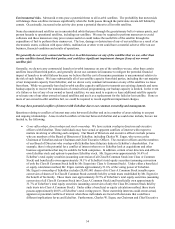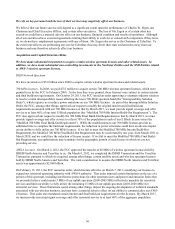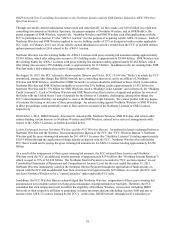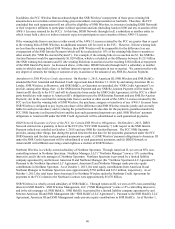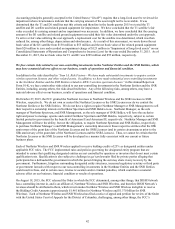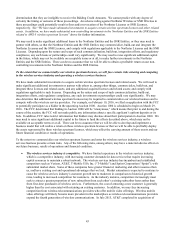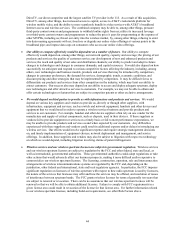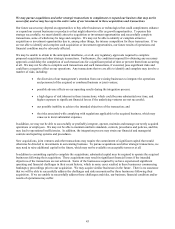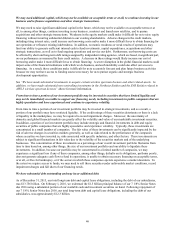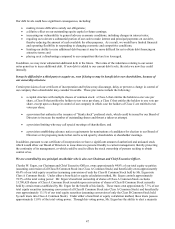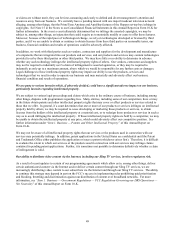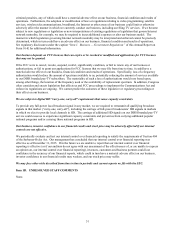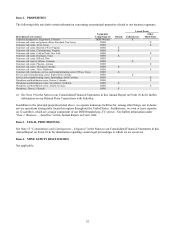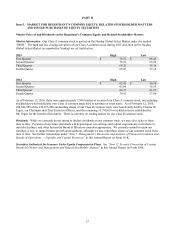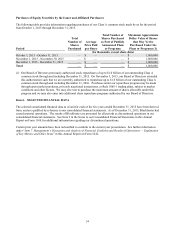Dish Network 2015 Annual Report Download - page 54
Download and view the complete annual report
Please find page 54 of the 2015 Dish Network annual report below. You can navigate through the pages in the report by either clicking on the pages listed below, or by using the keyword search tool below to find specific information within the annual report.44
DirecTV, our direct competitor and the largest satellite TV provider in the U.S. As a result of this acquisition,
DirecTV, among other things, has increased access to capital, access to AT&T’s nationwide platform for
wireless mobile video, and the ability to more seamlessly bundle its video services with AT&T’s broadband
Internet access and wireless services. The combined company may be able to, among other things, pressure
third-party content owners and programmers to withhold online rights from us; utilize its increased leverage
over third-party content owners and programmers to reduce the price it pays for programming at the expense of
other MVPDs, including us; thwart our entry into the wireless market, by, among other things, refusing to enter
into data roaming agreements with us; foreclose or degrade our online video offerings at various points in the
broadband pipe; and impose data caps on consumers who access our online video offerings.
x Our ability to compete effectively would be dependent on a number of factors. Our ability to compete
effectively would depend on, among other things, our network quality, capacity and coverage; the pricing of our
products and services; the quality of customer service; our development of new and enhanced products and
services; the reach and quality of our sales and distribution channels; our ability to predict and adapt to future
changes in technologies and changes in consumer demands; and capital resources. It would also depend on how
successfully we anticipate and respond to various competitive factors affecting the industry, including, among
others, new technologies and business models, products and services that may be introduced by competitors,
changes in consumer preferences, the demand for services, demographic trends, economic conditions, and
discount pricing and other strategies that may be implemented by competitors. It may be difficult for us to
differentiate our products and services from other competitors in the industry, which may limit our ability to
attract customers. Our success also may depend on our ability to access and deploy adequate spectrum, deploy
new technologies and offer attractive services to customers. For example, we may not be able to obtain and
offer certain technologies or features that are subject to competitor patents or other exclusive arrangements.
x We would depend on third parties to provide us with infrastructure and products and services. We would
depend on various key suppliers and vendors to provide us, directly or through other suppliers, with
infrastructure, equipment and services, such as switch and network equipment, handsets and other devices and
equipment that we would need in order to operate a wireless services business and provide products and
services to our customers. For example, handset and other device suppliers often rely on one vendor for the
manufacture and supply of critical components, such as chipsets, used in their devices. If these suppliers or
vendors fail to provide equipment or services on a timely basis or fail to meet performance expectations, we
may be unable to provide products and services as and when expected by our customers. Any difficulties
experienced with these suppliers and vendors could result in additional expense and/or delays in introducing our
wireless services. Our efforts would involve significant expense and require strategic management decisions
on, and timely implementation of, equipment choices, network deployment and management, and service
offerings. In addition, these suppliers and vendors may also be subject to litigation with respect to technology
on which we would depend, including litigation involving claims of patent infringement.
x Wireless services and our wireless spectrum licenses are subject to government regulation. Wireless services
and our wireless spectrum licenses are subject to regulation by the FCC and other federal, state and local, as
well as international, governmental authorities. These governmental authorities could adopt regulations or take
other actions that would adversely affect our business prospects, making it more difficult and/or expensive to
commercialize our wireless spectrum licenses. The licensing, construction, operation, sale and interconnection
arrangements of wireless telecommunications systems are regulated by the FCC and, depending on the
jurisdiction, other federal and international, state and local regulatory agencies. In particular, the FCC imposes
significant regulation on licensees of wireless spectrum with respect to how radio spectrum is used by licensees,
the nature of the services that licensees may offer and how the services may be offered, and resolution of issues
of interference between spectrum bands. The FCC grants wireless licenses for terms of generally ten years that
are subject to renewal or revocation. There can be no assurances that our wireless spectrum licenses will be
renewed or that we will be able to obtain additional licenses. Failure to comply with FCC requirements in a
given license area could result in revocation of the license for that license area. For further information related
to our wireless spectrum licenses, including build-out requirements, see other Risk Factors above.


